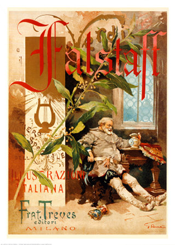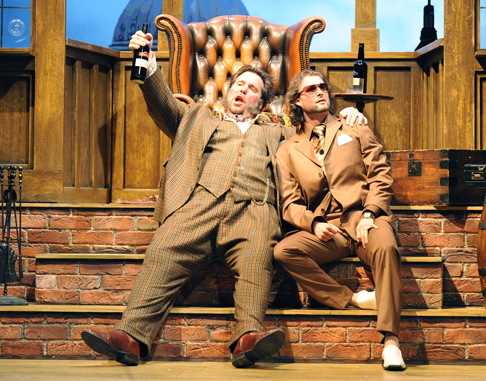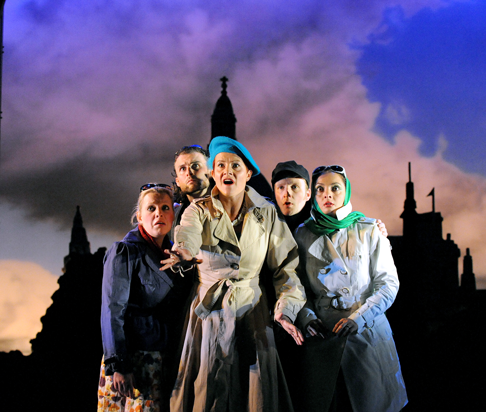Recently in Reviews
English Touring Opera are delighted to announce a season of lyric monodramas to tour nationally from October to December. The season features music for solo singer and piano by Argento, Britten, Tippett and Shostakovich with a bold and inventive approach to making opera during social distancing.
This tenth of ten Live from London concerts was in fact a recorded live performance from California. It was no less enjoyable for that, and it was also uplifting to learn that this wasn’t in fact the ‘last’ LfL event that we will be able to enjoy, courtesy of VOCES8 and their fellow vocal ensembles (more below …).
Ever since Wigmore Hall announced their superb series of autumn concerts, all streamed live and available free of charge, I’d been looking forward to this song recital by Ian Bostridge and Imogen Cooper.
The Sixteen continues its exploration of Henry Purcell’s Welcome Songs for Charles II. As with Robert King’s pioneering Purcell series begun over thirty years ago for Hyperion, Harry Christophers is recording two Welcome Songs per disc.
Although Stile Antico’s programme article for their Live from London recital introduced their selection from the many treasures of the English Renaissance in the context of the theological debates and upheavals of the Tudor and Elizabethan years, their performance was more evocative of private chamber music than of public liturgy.
In February this year, Albanian soprano Ermonela Jaho made a highly lauded debut recital at Wigmore Hall - a concert which both celebrated Opera Rara’s 50th anniversary and honoured the career of the Italian soprano Rosina Storchio (1872-1945), the star of verismo who created the title roles in Leoncavallo’s La bohème and Zazà, Mascagni’s Lodoletta and Puccini’s Madama Butterfly.
Evidently, face masks don’t stifle appreciative “Bravo!”s. And, reducing audience numbers doesn’t lower the volume of such acclamations. For, the audience at Wigmore Hall gave soprano Elizabeth Llewellyn and pianist Simon Lepper a greatly deserved warm reception and hearty response following this lunchtime recital of late-Romantic song.
Collapsology. Or, perhaps we should use the French word ‘Collapsologie’ because this is a transdisciplinary idea pretty much advocated by a series of French theorists - and apparently, mostly French theorists. It in essence focuses on the imminent collapse of modern society and all its layers - a series of escalating crises on a global scale: environmental, economic, geopolitical, governmental; the list is extensive.
For this week’s Live from London vocal recital we moved from the home of VOCES8, St Anne and St Agnes in the City of London, to Kings Place, where The Sixteen - who have been associate artists at the venue for some time - presented a programme of music and words bound together by the theme of ‘reflection’.
'Such is your divine Disposation that both you excellently understand, and royally entertaine the Exercise of Musicke.’
Amongst an avalanche of new Mahler recordings appearing at the moment (Das Lied von der Erde seems to be the most favoured, with three) this 1991 Mahler Second from the 2nd Kassel MahlerFest is one of the more interesting releases.
‘And there was war in heaven: Michael and his angels fought against the dragon; and the dragon fought and his angels, And prevailed not; neither was their place found any more in heaven … that old serpent … Satan, which deceiveth the whole world: he was cast out into the earth, and his angels were cast out with him.’
If there is one myth, it seems believed by some people today, that probably needs shattering it is that post-war recordings or performances of Wagner operas were always of exceptional quality. This 1949 Hamburg Tristan und Isolde is one of those recordings - though quite who is to blame for its many problems takes quite some unearthing.
There was never any doubt that the fifth of the twelve Met Stars Live in Concert broadcasts was going to be a palpably intense and vivid event, as well as a musically stunning and theatrically enervating experience.
‘Love’ was the theme for this Live from London performance by Apollo5. Given the complexity and diversity of that human emotion, and Apollo5’s reputation for versatility and diverse repertoire, ranging from Renaissance choral music to jazz, from contemporary classical works to popular song, it was no surprise that their programme spanned 500 years and several musical styles.
The Academy of St Martin in the Fields have titled their autumn series of eight concerts - which are taking place at 5pm and 7.30pm on two Saturdays each month at their home venue in Trafalgar Square, and being filmed for streaming the following Thursday - ‘re:connect’.
The London Symphony Orchestra opened their Autumn 2020 season with a homage to Oliver Knussen, who died at the age of 66 in July 2018. The programme traced a national musical lineage through the twentieth century, from Britten to Knussen, on to Mark-Anthony Turnage, and entwining the LSO and Rattle too.
With the Live from London digital vocal festival entering the second half of the series, the festival’s host, VOCES8, returned to their home at St Annes and St Agnes in the City of London to present a sequence of ‘Choral Dances’ - vocal music inspired by dance, embracing diverse genres from the Renaissance madrigal to swing jazz.
Just a few unison string wriggles from the opening of Mozart’s overture to Le nozze di Figaro are enough to make any opera-lover perch on the edge of their seat, in excited anticipation of the drama in music to come, so there could be no other curtain-raiser for this Gala Concert at the Royal Opera House, the latest instalment from ‘their House’ to ‘our houses’.
"Before the ending of the day, creator of all things, we pray that, with your accustomed mercy, you may watch over us."
Reviews

24 Oct 2008
Falstaff at Pimlico Opera, Cadogan Hall
Pimlico Opera is based at the Grange in Hampshire, home of the Grange Park opera festival, but pre-dates its sister company by a decade and has been giving national tours of popular operas since the 1980s as well as doing some pioneering opera and music theatre projects in UK prisons.
There are many concessions which have to be made when touring on a budget, and nothing about this Falstaff was as big as it normally is. The score, which had several cuts, was performed in an (uncredited) arrangement for an orchestra of fewer than 30, and no chorus (the principals making up the vocal ensemble wherever appropriate). At London’s Cadogan Hall there is nowhere to put a backdrop, and all that survived of the adaptable touring set was a versatile set of blocks which transformed into the various different settings with the addition or subtraction of panels or furniture. The scene changes — given that Cadogan Hall has no curtain — were entertaining to watch, almost little scenes in their own right.
Daniel Slater’s production (revived by Hazel Gould) was performed in modern dress, and Act 1 Scene 2 used one of the favourite generic settings for contemporary productions, the luxury health club complete with sun-loungers. It was colourful but not very original, and the possibilities of the setting were ignored — why couldn’t Act 2 Scene 2 be set there too, with Falstaff being dumped in the swimming pool at the end? But no, for that scene we were in the traditional setting chez Alice, with the Thames running past the back door as per the original stage directions. At least there was one bit of business which utilised the unusual layout, with the orchestra to the right of the stage area; Falstaff hid from Ford by crouching next to the band and attempting to blend into the violin section.
Falstaff himself was also on a smallish scale, with minimal padding, but while the young Swiss baritone David-Alexandre Borloz lacked physical bulk, there was nothing insubstantial about his vocal resources, which were if anything a size too big for the intimate venue. James Cleverton’s Ford was also impressive. Rebecca Cooper’s neat, classy Alice was vocally secure, but dramatically she was upstaged by Emma Carrington’s sardonic Quickly and Margaret Rapacioli’s Meg with her wonderfully expressive eyes.
As Fenton, Patrick Ashcroft’s tenor was rather monochrome and lacked bloom in his lovely Act 3 aria, but he had a natural and charming stage manner, while Verity Parker’s Nannetta was a vocally appealing and believably youthful girl-next-door (though I couldn’t work out why was she made to wear a black cloak over her white fairy costume — she would have looked far more effective without).
 David-Alexandre Borloz (Falstaff) and James Cleverton (Ford) in The Garter Inn. Pimlico Opera 2008.
David-Alexandre Borloz (Falstaff) and James Cleverton (Ford) in The Garter Inn. Pimlico Opera 2008.
Alice Farnham conducted with vigour, but the limitations of the reduced score were evident throughout — the lack of richness in the opera’s musical texture was a significant loss to the piece. It was just as well that Verdi’s final opera (not, as the programme stated, his only comedy) is virtually indestructible, and that the cast was a more than solid ensemble. The joy of the final fugue could not have come across more effectively on the stage of a major international house.
Regrettably, the audience, too, was pared down — the small hall was far less than half full.
Ruth Elleson © 2008
 (L-R) Verity Parker (Nanetta), James Cleverton (Ford), Rebecca Cooper (Alice), Patrick Ashcroft (Fenton) and Margaret Rapacioli (Meg) Act 3, Scene 1. Pimlico Opera 2008
(L-R) Verity Parker (Nanetta), James Cleverton (Ford), Rebecca Cooper (Alice), Patrick Ashcroft (Fenton) and Margaret Rapacioli (Meg) Act 3, Scene 1. Pimlico Opera 2008
Click here for an excerpt via YouTube.
[Editor’s Note: It is with deep regret to note that David-Alexandre Borloz (age 32) died in his sleep on 19 October 2008]


